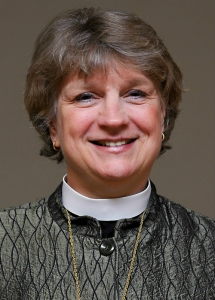
This blog post is an excerpt from the “charge to action” shared by Bishop Ann Svennungsen at the “Service of Prayer and Lament Honoring the Life of Philando Castile” held on July 9, 2016, at the Chapel of the Incarnation at Luther Seminary in St. Paul. Philando Castile was killed during a traffic stop at a corner barely a mile from the seminary. This worship service and procession was sponsored by Augsburg College, Lutheran Social Service of Minnesota, Luther Seminary, the Saint Paul Area Synod, and the Minneapolis Area Synod. More than 200 of the 400-plus worshipers participated in the procession.
And so we prepare now to walk – together – marching to the place where Philando Castile was killed.
We walk as part of a long line of the faithful crying out for justice. We walk with the Israelites – led by God’s pillar of fire – marching in an Exodus from oppression to freedom. We walk with the children of Soweto and the women of London. We march with our brothers and sisters in Selma, Birmingham, and Washington, D.C.
We march because our society is all too willing to close its eyes to injustice and oppression.
So, we march to make the invisible visible. Some may think that white privilege isn’t real, that systemic racism doesn’t infect our whole society. But we know that privilege and racism are real. And we are here, ready to walk, to visibly affirm that these real issues must be addressed.
But, we also walk as a visible sign of repentance. As the Rev. Martin Luther King Jr. put it, “We … repent in this generation not merely for the hateful actions of the bad people but for the appalling silence of the good people.” We march because we will be silent no longer.
We walk in repentance, in humility. We set out – weeping with those who grieve and calling the powerful to account.
At the 2016 Minneapolis Area Synod Assembly, voting members decided to ask every congregation to write a racial justice mission statement, to talk openly about racism, to acknowledge that we in the church can be catalysts for change.
Maybe, as we walk today, we can think about our own individual mission statements for racial justice. What will I do? How will I hold myself accountable? We are fighting structural evil. We need structures of accountability; we need one another to call us to courageous engagement.
So we join hands today to walk – a sign of our repentance, our solidarity, and our commitment. We walk today to accompany all who grieve so deeply and to advocate for real change: for employment and a living wage, for educational success for all children, for affordable housing, for equitable and transparent criminal justice systems.
We walk because we are called to do justice, love mercy, and walk humbly with God.
We walk, even while knowing this is just one step in our long march toward justice.
So let us walk – joined together – following Jesus who journeyed even through death to resurrection.

